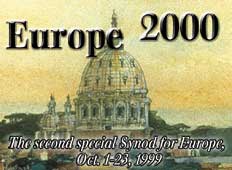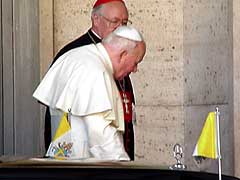

 |
 |
|
|
Might the pope resign? By THOMAS C. FOX 
Some questions that repeatedly come up in quiet dinner conversations, often during the second carafe of Italian table wine, have to do with Pope John Paul II’s health and papal succession. What happens, for example, in the event the pope was to become physically or mentally incapacitated? Who would run the church? Related to these questions is another: Might an ailing pope consider resigning for the sake of the church? In an age in which medicine can considerably extend human life, in some cases beyond conscious mental activity, the question of what happens to a pope unable to carry out the work of his office becomes more pressing. Or what would happen if pope were to lapse into temporary or permanent senility? It said, though it cannot be confirmed, that Pope John Paul II has written a letter intended to deal with these potential crises. It would be reasonable to expect he has. After all, he has had much time to think about them, having been the victim of an assassination attempt in 1981 and having had to go under the knife for intestinal surgery years later. What the letter says - if indeed there is such a letter - is not known. It can be surmised that the letter would be in the hands of Cardinal Camillo Ruini, the vicar of the diocese of Rome, among others, and that the final judgement of whether Pope John Paul lacked the mental or physical ability to carry on as leader of the Roman Catholic church would be a judgement made by a committee of qualified physicians. A temporary incapacitation would, it seem, pose no serious problem. The Vatican congregations and pontifical councils that make up the Roman curia could carry out the month to month work of the church. Their work could plausibly go on for months, even years, with an ailing pope. More difficult would be a finding by a group of physicians that the Holy Father was permanently unable to carry out the responsibilities of the papal office. Unlike the Western democracies, which have elaborate constitutionally- mandated executive succession scenarios in the events of emergencies, the Roman Catholic church, as an absolute monarchy, has no such rules. The Holy Father alone has the right to determine what would happen to him should he not be able to function as pope. But there is another question. Might Pope John Paul resign before his health deteriorates to a crisis point? It is widely believed, though not officially confirmed, that the pope is suffering from Parkinson’s disease. Early signs of the illness began to show nearly ten years ago when Pope John Paul’s hand could be viewed to be shaking at public functions. The disease appears to have advanced in recent years. The pope’s face appears frozen, nearly always expressionless, another sign of the advancing disease. He walks with difficulty. One church observer familiar with Parkinson’s disease says it is not necessarily fatal. However, the medicines taken to combat the effects of the disease eventually take their toll -- and can lead to death. He said such deterioration happens over a period of ten or more years. Pope John Paul II is believed to have had the disease for at least nine years. A priest who works closely with the Holy Father says he “has only four good hours” each day. His schedules now accommodate those hours. Anyone familiar with the once hearty and still strong-willed Karol Wojtyla knows he has a mind of his own. He has had an almost mystical belief, going back to statements made to him even before his election as pope, that he would live to lead the church into the 21st century. Next year’s Jubilee 2000 Holy Year celebrations are packed with activities and reflect the importance of this milestone in church history in the mind of the pope. What if the Holy Father has had a mystical belief driving him, enhanced by his escape of an assassin’s bullet, that he has been called to deliver Catholicism to the 21st century? The Holy Year, which has been a major part of this pope’s planning and includes a hoped-for trip to the Holy Land, begins Christmas eve, in just over two months. Roman streets and monuments are getting face-lifts throughout the city. The Holy Year runs through the Feast of the Epiphany (Jan. 6) of the year 2001. Some church observers say that if the Holy Father, for whatever reason, thought it in the best interest of the church to resign, the last day of the Holy Year would make the most sense. The pope turns 80 next May. This is the age that Pope Paul VI decided cardinals are too old to be voting participants in a conclave. By the same reasoning, it might be a good retirement age for a pope. It was widely reported that Pope Paul VI considered the prospect of resigning. It is said that after giving it careful thought, however, he decided that taking the step would bind his successors. Of course, no decision by any pope to resign would necessarily bind a future pope. But precedent could pressure future popes. There are not many precedents for papal resignations -- but they exist. Four popes have abdicated. Clement I, number three after Peter, in 97; Pontian, in 235, to allow a successor to take over when he was carted off to Sardinia and the mines; Benedict IX, in 1045 (though he made a comeback); and Celestine V, in 1294, the last pope to resign. All except Benedict were canonized. The worry some church observers have about a papal resignation stems from the fear of potential schism. Two popes could be unseemly. Catholics intent on ignoring one could cite a statement made by the other. It could become a mess. Were Pope John Paul II to resign from office he would need to make it very clear his successor spoke with absolute authority and would have to enter into private retirement. It is known that Pope John Paul would love to visit his native Poland again and has said so publicly. Might he be hinting he would retire in Poland? Other cautions are cited. Some say a “resigned” pope could have significant influence on the selection of his successor. Conceivably he could take part in the conclave, although this would be highly unlikely. In any event, a living pope would cast a long shadow upon his successor. Once a new pope were elected, it is asked, would he truly feel free to act as an independent pontiff while his predecessor was still alive? It is a question to which there is no clear answer. Pope John Paul II’s health is declining. Some question whether he has the strength to make it through an enormously taxing Holy Year. Most scheduled events, however, can take place without him. Only God knows when this pontificate will come to an end. Church leaders are acutely aware, meanwhile, that this pontificate is fading. Next year, the Holy Father has called for a worldwide synod of bishops. The subject of their month-long discussions will be the role of bishops themselves. This synod is tentatively scheduled for next October. Both because of the timing and the theme of the synod it could be an important prelude for another conclave. It is too early to consider Pope John Paul’s work of more than two decades finished. Many church observers, however, know that it is not too early to be looking into the future and quietly asking who may be the man best suited to lead the church in the early years of the 21st century. At the moment it these question come up more in dinner conversation than the official work of the church - but it is taking place, nevertheless. Tom Fox is NCR publisher and can be reached at TCFOX@aol.com National Catholic Reporter, October 19, 1999 |